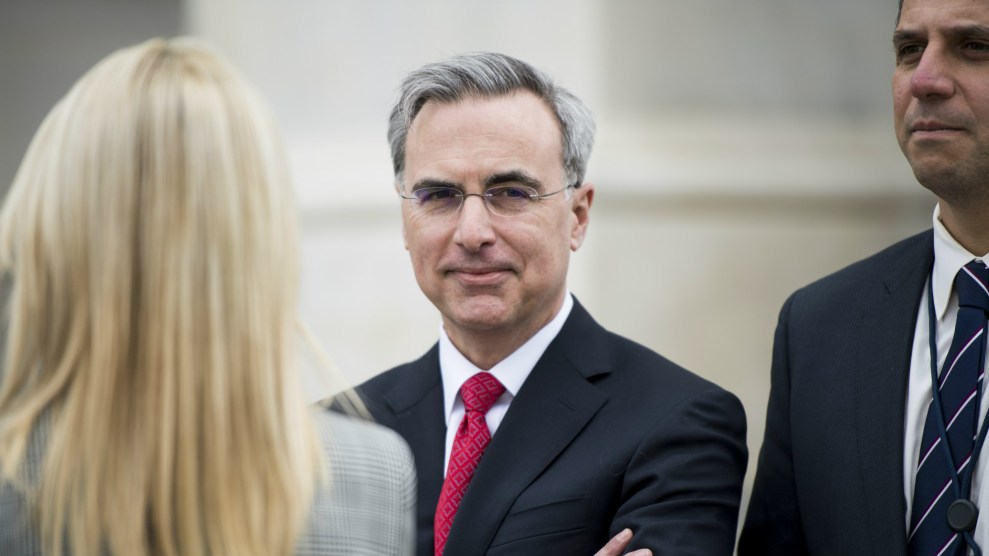
Photo By Bill Clark/CQ Roll Call via AP Images
Since taking over as White House counsel last December, Pat Cipollone has repeatedly revised his personal financial disclosure—indicating the information he previously provided was incomplete or incorrect—yet the Office of Government Ethics has still not signed off on the document. It’s an unusual situation for the top White House lawyer, whose responsibilities include ensuring that the president and his staff comply with ethics laws.
Most top administration officials are required to submit an annual report showing their assets, liabilities, and sources of income, a document designed to ensure that public servants making decisions on behalf of the public are free from conflicts of interest. The forms go through several levels of review to verify the information is accurate and any potential conflicts are disclosed. If there are conflicts, officials must submit an agreement in which they describe the actions they have taken to eliminate them. The final step is certification by the Office of Government Ethics, the federal government’s in-house ethics watchdog.
Cipollone first submitted his disclosure on December 10, 2018, the day he started working in the White House. He reported earning more than $6.7 million over the previous year from his job as a corporate litigator, for clients including Warner Music Group, Sony, Bechtel, and his now-boss Donald Trump, whom he represented during the Russia probe before joining the administration. Cipollone has since revised his disclosure on three occasions.
It’s unclear why OGE has yet to approve the form, and the White House did not respond to a request for comment on the matter. But Virginia Canter, a former White House ethics adviser who is now chief ethics counsel for watchdog group Citizens for Responsibility and Ethics in Washington, said the delay raises questions. Certification can take weeks or months for particularly thorny issues, but for an official in Cipollone’s job—which involves ethics oversight—the extended delay is particularly curious.
“In many White House counsel’s offices, the counsel is viewed as the chief ethics officer, and he’s the chief adviser to the president, so he needs to be completely above reproach,” Canter says. “And here is an extraordinarily long time for this review process to be going on.”
Canter says it’s difficult to know for sure what is holding up the certification, but she says several things stand out in Cipollone’s initial disclosure. For instance, she says, Cipollone lists “confidential client” three times under his sources of income. Confidentially agreements may preclude Cipollone from naming those clients, but the certification process would typically involve him explaining to ethics officials why this past legal work won’t pose a conflict in his current role.
Canter says it is also possible there is some kind of technical hangup—perhaps information that Cipollone has yet to provide. But not taking care of those issues promptly is also a red flag, Canter says.
“It’s very unusual for the counsel of the president not to have this resolved,” she says. “What lawyer wants to put themselves in this position? It’s totally unnecessary. They should want to be in compliance with the law.”
Cipollone is not the only Trump official who has had trouble getting his disclosure cleared by OGE. Trump’s son-in-law, Jared Kushner, updated his personal financial disclosure multiple times before OGE finally signed off, in the process adding dozens of assets he omitted from his original form. Among those were an investment in Cadre, a startup that received money from a Goldman Sachs fund bankrolled by the government of Saudi Arabia, and the family’s multi-million-dollar art collection. And last year, OGE determined that Commerce Secretary Wilbur Ross had falsely reported selling certain holdings he pledged to liquidate. Ross said this was an oversight, and his 2018 financial disclosure was finally certified a few months ago.
Cipollone’s entire personal financial disclosure can be read here.













